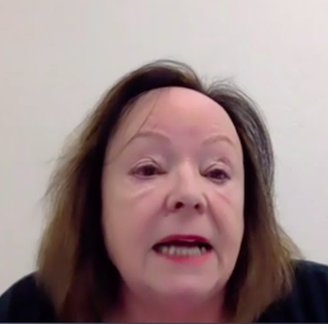
Screenshots from Tuesday’s meeting (clockwise from top left): Supervisor Rex Bohn, Supervisor Michelle Bushnell, Supervisor Mike Wilson, Supervisor Virginia Bass, Health Officer Ian Hoffman and Supervisor Steve Madrone.
###
Another big day for the Humboldt County Board of supervisors. Let’s get right to it, shall we?
COVID-19 Update
In his latest COVID-19 update, Humboldt County Health Officer Dr. Ian Hoffman said that while he expects the county to remain in the state’s purple tier, denoting widespread virus, for the coming weeks, he’s hopeful that we’re moving “over the top of that plateau” and can look forward to declining case counts. That’s what’s happening at the state level, and we tend to follow a bit behind statewide trends, he said. (Tuesday’s new-case count was just five.)
Still, the county is currently experiencing its highest rate of hospitalizations in the pandemic, though that’s not unexpected. “That’s sort of the last thing we see in a surge, so we’ll keep a close eye on that,” Hoffman said.
Spread of the disease “continues to be mostly from people you know,” such as multi-household gatherings, with a bit through travels and some outbreaks in congregate living facilities, according to Hoffman.
The county now has “an amazing capacity” for testing, in part because a lot fewer people are getting tested, he said, and he encouraged people to get tested frequently, saying it’s extremely important given the likelihood of COVID-19 variants popping up in the community. None have been detected in Humboldt thus far (only about four percent of samples get sent for the type of sequencing that would identify a variant), but Hoffman said widespread testing will reduce the likelihood that of new variants spreading rapidly.
As for vaccinations, through Monday a total of 18,208 doses have been administered countywide, with just over 15,000 being first doses and about 2,700 being second doses. That equates to just over 13 percent of the county that’s received at least one dose, including about half of those age 75 and older, Hoffman said. Well over 15 percent of the local native population has received at least one dose of vaccine, but the local Latinx community is lagging behind at around 6 percent.
The county is preparing to open vaccine availability more widely in the next few weeks, though Hoffman offered a word of warning. “With the variants coming [and the] potential for another surge, it’s extremely important we continue with … distancing, masking, avoiding gatherings [and] washing hands,” he said. “The next few months are a really fragile time … .”
Marketing Report
Later in the morning, the board and members of the public embarked on a robust discussion about how best to market Humboldt County to tourists. Julie Benbow, executive director of the Humboldt County Visitors Bureau, launched the conversation with a report on her organization’s latest efforts and plans for the future.
The HCVB has long held a contract with the county as the lead agency responsible for “advertising, promoting and marketing” our resources and assets. In recent years it has come under some scrutiny for failing to include cannabis in its marketing efforts.
In 2019, the City of Eureka — another longtime financial supporter of the HCVB — decided to pull its funding (to the tune of $370,000 annually), and the county has also considered looking at other suitors for its marketing dollars. Instead, in 2019, the board asked the HCVB to come back every six months with updates on its progress and marketing strategies.

Benbow
Benbow’s presentation, which was delayed more than six months by the pandemic, focused on the economic power of tourism, and she said the bureau is “woefully underfunded.” She said cannabis hasn’t been included in the marketing efforts to date because it remains federally illegal, and 80 percent of the bureau’s advertising efforts were done nationally and internationally. A report submitted by the HCVB proposed two possible levels of county funding for the next year — $692,500 (level one) and $880,000 (level two).
“The key to tourism success over the next five years is increased investment,” Benbow said.
County staff plans to issue a request for proposals (RFP) for cannabis-specific marketing efforts sometime in or near April, according to Economic Development Director Scott Adair. But Second District Supervisor Michelle Bushnell encouraged the HCVB not to wait on marketing cannabis, and many public commenters agreed.
Amy Cirincione O’Connor, owner of the Humboldt Bay Social Club, blasted the county’s marketing plan as “outdated,” saying her business has never gotten any help from the HCVB. “We believe firmly in integrating cannabis, and we believe Humboldt County deserves a much more sophisticated marketing strategy,” she said.
Natalynne DeLapp, executive director of the Humboldt County Growers Alliance, a nonprofit cannabis industry trade group, presented to the board a 17-page comment letter calling for a more diversified, open and inclusive marketing strategy, one that’s not so entwined with the Humboldt Lodging Alliance (HLA), an organization of hotel owners that collects millions of dollars in transient occupancy taxes per year.
A succession of cannabis industry professionals proceeded to call in with public comments, urging the board to reassess its tourism strategy and incorporate cannabis and voicing concern about the HLA’s connections to multinational hotel chains.
The county’s current contract with the HCVB expires in June, and after today’s discussion the board agreed to receive the bureau’s report and return later to discuss how transient occupancy tax revenues are spent. Treasurer-Tax Collector John Bartholomew noted that the county could bring in hundreds of thousands of dollars more in revenue simply by applying those taxes to RV parks and campgrounds, a practice that was discontinued in 1993.
County staff was directed to return in 90 days with a detailed analysis of how transient-occupancy tax revenues are spent and recommendations for where increased revenues might go.
Hemp Moratorium
The county currently has a moratorium on industrial-scale hemp cultivation, which was instituted to give staff time to address concerns from local cannabis growers, including the potential for hemp pollen to drift and cross-pollinate with their crops and the possibility that hemp could introduce new pests and pathogens.
Last month, the Humboldt County Planning Commission advanced a “permanent” moratorium on industrial hemp cultivation, despite opposition from a small but vocal minority who want to grow the plant as a source of CBD. Today, the board was considering whether to pass that an ordinance instituting the ban, and also whether to allow an exemption for College of the Redwoods, which has expressed an interest in growing the plant for education and research purposes.
Public comment was largely a rehash (if you’ll pardon the expression) of previous debates on the topic of hemp. Outspoken hemp activist Benjamin Franklin Grant called the permanent moratorium “a job-abortion bill,” saying local businesses are currently forced to import hemp from Oregon to produce products with CBD.
But the majority of callers were from within the THC-heavy branch of the cannabis industry, and they encouraged the board to pass the ban. Some pointed out that if people really want to grow hemp, they can take advantage of the county’s streamlined application process for grows of less than 2,000 square feet (smaller than the threshold for industrial-scale) or grow within the “personal use” limits of 100 square feet on parcels smaller than an acre; up to 200 square feet on parcels of one to five acres; and up to 400 square feet on parcels larger than that.
By law, the county’s temporary moratorium can only last until May 10. If it expires, hemp cultivation would be allowed just like any other agricultural crop thanks to the 2018 federal Farm Bill. When the matter came back to the board, Third District Supervisor Mike Wilson said that if the county didn’t move forward with the ban today, “we’d see an explosion of concerns from all over the county.”
Fifth District Supervisor Steve Madrone said the medical benefits of CBD are important, but he agreed with commenters who said there’s a lot of room to grow under the “personal use” provisions.
The board wound up voting unanimously to pass the permanent ban — though as staff noted, it’s not technically “permanent.” The board has discretion to come back and alter it at any time. In the same motion, the board voted to come back at a future date to consider a special permit process for giving an exemption to College of the Redwoods — and possibly to other organizations, provided that they’d be growing it for non-commercial and/or educational purposes.
CLICK TO MANAGE